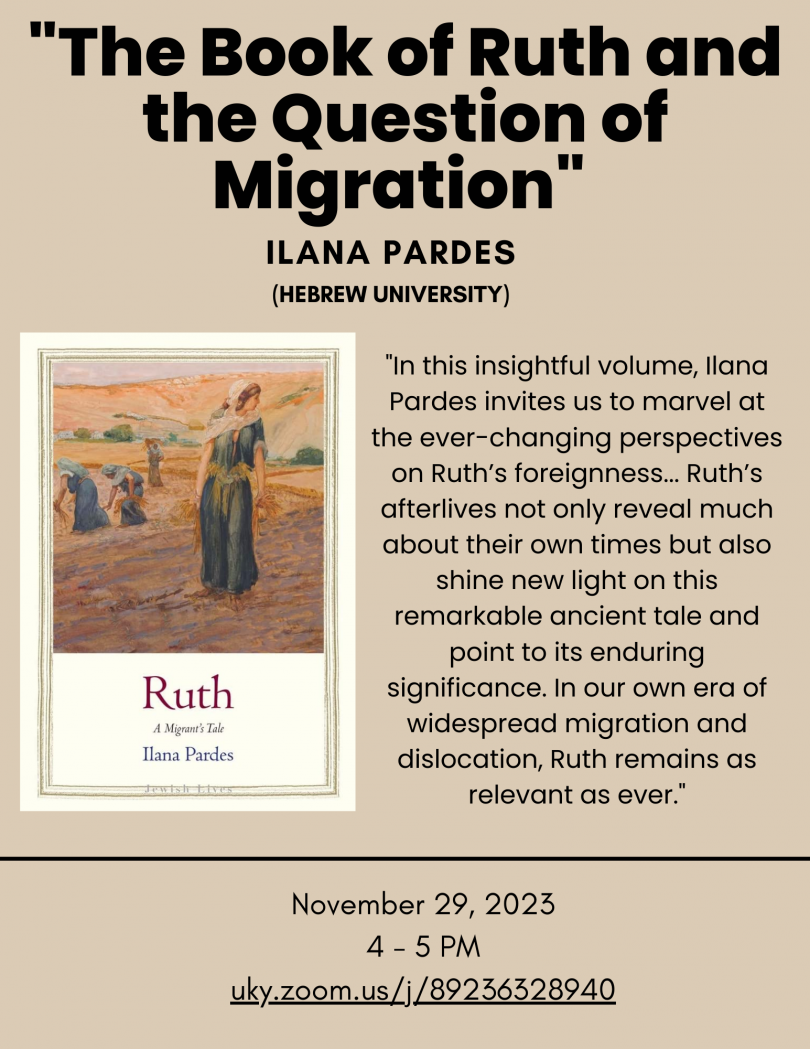“The Book of Ruth and the Question of Migration”
“The Hebrew Bible from a Jewish Scholarly Perspective”
Fall 2023 Lecture Series
Webinar Link: https://uky.zoom.us/j/89236328940

“The Hebrew Bible from a Jewish Scholarly Perspective”
Fall 2023 Lecture Series
Webinar Link: https://uky.zoom.us/j/89236328940

“The Hebrew Bible from a Jewish Scholarly Perspective”
Fall 2023 Lecture Series
Webinar Link: https://uky.zoom.us/j/85907784100

Today’s Israelite Samaritans are ‘living history’, as we respect and observe our way of life and heritage. Through our sometimes difficult past, we have learned to coexist harmoniously with our neighbours, and we are a bridge for peace (gesher leshalom) between all peoples . We are the root of the Abrahamic religions in the region, including Samaritanism, Judaism, Christianity, Islam, and the Druze and Bahai faiths. Though rooted deeply in the past, we are a vibrant modern community with contemporary enterprises and interests. In March 1919 there were only 141 individuals, in Nablus and Jaffa. By September 2014, the Israelite Samaritan Community numbered 770 souls, divided into four households, all in the Holy Land. This talk will explore the past, present, and future of the Israelite Samaritan people.
Benny recently published "The Israelite Samaritan Version of the Torah: First English Translation Compared with the Masoretic Version" with Eerdmans Publishing.
Today’s Israelite Samaritans are ‘living history’, as we respect and observe our way of life and heritage. Through our sometimes difficult past, we have learned to coexist harmoniously with our neighbours, and we are a bridge for peace (gesher leshalom) between all peoples . We are the root of the Abrahamic religions in the region, including Samaritanism, Judaism, Christianity, Islam, and the Druze and Bahai faiths. Though rooted deeply in the past, we are a vibrant modern community with contemporary enterprises and interests. In March 1919 there were only 141 individuals, in Nablus and Jaffa. By September 2014, the Israelite Samaritan Community numbered 770 souls, divided into four households, all in the Holy Land. This talk will explore the past, present, and future of the Israelite Samaritan people.
Benny recently published "The Israelite Samaritan Version of the Torah: First English Translation Compared with the Masoretic Version" with Eerdmans Publishing.
Today’s Israelite Samaritans are ‘living history’, as we respect and observe our way of life and heritage. Through our sometimes difficult past, we have learned to coexist harmoniously with our neighbours, and we are a bridge for peace (gesher leshalom) between all peoples . We are the root of the Abrahamic religions in the region, including Samaritanism, Judaism, Christianity, Islam, and the Druze and Bahai faiths. Though rooted deeply in the past, we are a vibrant modern community with contemporary enterprises and interests. In March 1919 there were only 141 individuals, in Nablus and Jaffa. By September 2014, the Israelite Samaritan Community numbered 770 souls, divided into four households, all in the Holy Land. This talk will explore the past, present, and future of the Israelite Samaritan people.
Benny recently published "The Israelite Samaritan Version of the Torah: First English Translation Compared with the Masoretic Version" with Eerdmans Publishing.
In addition to the medieval harp and percussion, Vanessa Paloma brings the intimacy of private singing and synagogue prayers to international concert venues.
In addition to the medieval harp and percussion, Vanessa Paloma brings the intimacy of private singing and synagogue prayers to international concert venues.
In addition to the medieval harp and percussion, Vanessa Paloma brings the intimacy of private singing and synagogue prayers to international concert venues.